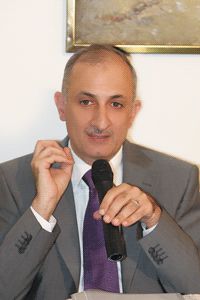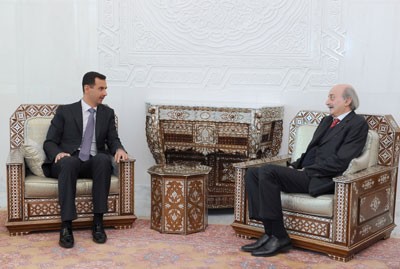Lebanese politician Khaldoun As-Sharif declared that optimism which prevailed on the political scene during the last few hours was serious and said that the cabinet lineup reached its final stage after the distribution of shares a
Khaldoun Sharif to Al-Manar Website:
Cabinet Birth Imminent; Distribution of Shares Completed
Aoun’s Share: 8 Portfolios including Telecoms
Delay in Cabinet Formation Was in Lebanon’s Interest
Cabinet Formation is International, Regional Demand
No Direct Pressures behind Delay in Cabinet Formation
Areslan Has Right to Demand… But Cabinet Must Be Formed!
 Lebanese politician Khaldoun As-Sharif declared that optimism which prevailed on the political scene during the last few hours was serious and said that the cabinet lineup reached its final stage after the distribution of shares and portfolios was completed.
Lebanese politician Khaldoun As-Sharif declared that optimism which prevailed on the political scene during the last few hours was serious and said that the cabinet lineup reached its final stage after the distribution of shares and portfolios was completed.
In an exclusive interview with Al-Manar website, Sharif, who has close ties with Prime Minister-Designate Najib Miqati, expressed belief that the cabinet’s birth was imminent. He said the Telecoms portfolio would likely remain with the Change and Reform bloc “which gained eight portfolios and two state ministries according to the recently-reached agreement”.
While noting that the cabinet formation has become an international and regional demand, Sharif rejected claims of direct pressure on the premier-designate. He also said that the delay of the cabinet formation process throughout the last four months was in the interest of Lebanon, as it allowed the country to absorb all sectarian waves in the region.
DISTRIBUTION OF PORTFOLIOS COMPLETED
Sharif told Al-Manar website that the recent wave of optimism was serious. He was referring to reports about a possible formation of the government in the next few days after the leaders of the new majority held ice-breaking talks a day earlier.
 On Wednesday, a meeting joined Parliament Speaker Nabih Berri and Prime Minister-Designate Najib Miqati with the head of the Change and Reform parliamentary bloc MP Michel Aoun, the head of the Loyalty to the Resistance parliamentary bloc MP Mohamad Raad, the head of the National Struggle Front MP Walid Jumblatt, the head of the Marada movement MP Sleiman Franjieh, the head of the Lebanese Democratic Party MP Talal Areslan and the head of the Syrian Social Nationalist Party MP Assaad Hardan.
On Wednesday, a meeting joined Parliament Speaker Nabih Berri and Prime Minister-Designate Najib Miqati with the head of the Change and Reform parliamentary bloc MP Michel Aoun, the head of the Loyalty to the Resistance parliamentary bloc MP Mohamad Raad, the head of the National Struggle Front MP Walid Jumblatt, the head of the Marada movement MP Sleiman Franjieh, the head of the Lebanese Democratic Party MP Talal Areslan and the head of the Syrian Social Nationalist Party MP Assaad Hardan.
Sharif ruled out the possibility that the efforts to form the government could suddenly collapse. He explained that the cabinet lineup had actually reached its final stage; the lineup. “The distribution of portfolios and shares was completed,” he pointed out. “What’s most probable is that things are heading in the right direction and in the direction of forming a government soon,” he added. Yet, he said facing obstacles remains always possible in a country like Lebanon.
The northern politician said that the ice-breaking meeting among the leaders of the new majority one day earlier at the Parliament was the exit, which reflected the positive developments of the last few days. He recalled that the Free Patriotic Movement leader MP Michel Aoun had announced last week that all internal obstacles were resolved. “After Aoun’s statement, meetings were intensified until we’ve reached this level,” he said.
IT IS ARSLAN’S RIGHT TO DEMAND… While confirming that the cabinet lineup has reached its final stage, Sharif revealed that the share finally given to the Change and Reform of MP Michel Aoun includes eight portfolios and two state ministries. He noted that the Telecoms portfolios would, most likely, remain with the General’s bloc. However, he said he could not confirm anything at the moment “given that the cooking process is still underway,” in reference to the ongoing consultations between the PM-Designate and the other blocs.
While confirming that the cabinet lineup has reached its final stage, Sharif revealed that the share finally given to the Change and Reform of MP Michel Aoun includes eight portfolios and two state ministries. He noted that the Telecoms portfolios would, most likely, remain with the General’s bloc. However, he said he could not confirm anything at the moment “given that the cooking process is still underway,” in reference to the ongoing consultations between the PM-Designate and the other blocs.
Asked about the latest stance of the head of the Lebanese Democratic party MP Talal Areslan, Sharif said the latter had the right to request whatever he finds appropriate. “However, the government must be formed at the end. The PM-designate cannot fully satisfy all sides,” he stressed. “It’s the right of the political sides to demand whatever they believe is their right. But it’s also the right of the premier-designate to form the government in the way he finds appropriate.”
Areslan has reiterated his rejection to be given the post of Minister of State. He has repeatedly demanded a more effective portfolio as a condition for his participation in the cabinet.
WE MUST RESPECT INTERNATIONAL CIRCUMSTANCES
On the possible foreign reasons behind the delay in the cabinet formation process, Sharif said that claims of direct external pressures on the premier-designate were not true. “These are political claims, nothing more. Nobody directly pressures anybody in politics,” he said. Yet, he added that “whoever wants to form a government in Lebanon should respect the international and regional circumstances. Lebanon is not isolated from its surrounding and therefore, the Lebanese government must be acknowledged by the international community”.
Asked about the meeting that was held between Syrian President Bashar Assad and MP Walid Jumblatt, after which Assad expressed hope that the Lebanese cabinet would see the light soon, Sharif said that Assad’s statement, in addition to the statements of international envoys who regularly meet the PM-Designate and urge him to accelerate his efforts to form the government, signaled that the cabinet formation in Lebanon had become an international and regional demand.
DELAY IN CABINET FORMATION POSITIVE
Also on the ability of the government to face the upcoming challenges, including the new government’s policy statement, Sharif called to wait the cabinet’s birth first. “Let’s deal with the issues one by one,” he said.
Sharif, meanwhile, said that the delay in the cabinet formation process was not absolutely negative. “It was in the interest of Lebanon as it helped the country absorb all sectarian waves which hit the region during the last few months. The delay also led to a better analysis of the political developments in the region,” he added.
He stressed that the appointment of Najib Miqati prevented tensions in Lebanon. “In case Saad Hariri remained the head of the government in Lebanon or the new majority appointed a premier-designate from the new majority, the situation would have been worse,” he said. “Appointing a moderate premier led to the absorption of the tense situation,” he explained.
